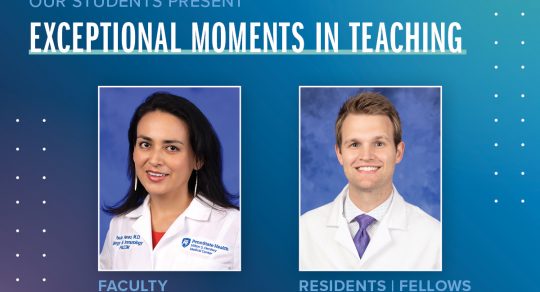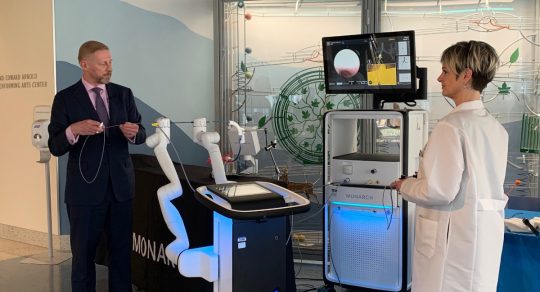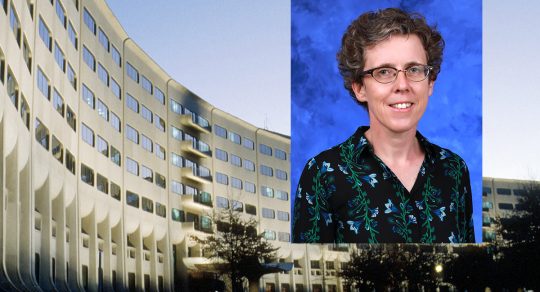Fellowship
Pulmonary and Critical Care Medicine
The Pulmonary and Critical Care Medicine Fellowship at Penn State Health Milton S. Hershey Medical Center is a three-year, ACGME-accredited program that admits four fellows per year.
Explore More
The goal of the Pulmonary/Critical Care Medicine Fellowship is to provide exceptional training for the next generation of leaders in pulmonary/critical care medicine, and to provide an individualized experience that will allow graduates to be successful in a career path of their choosing.
The Division of Pulmonary, Allergy and Critical Care Medicine aims to provide the best patient care while achieving the institutional goals of respect, integrity, teamwork and excellence. The program provides fellows with mentorship and support in a collaborative, inclusive environment where trainees have the opportunity to develop skills in clinical medicine, medical education, leadership, research and scholarship.

Program Overview
The program takes the time to understand each fellow’s individual needs, to provide every fellow with the opportunity to create a customized track for themselves. By providing effective mentorship, catering to the interests of each fellow and maintaining a broad range of skills within the core faculty, the program ensures each trainee has a thorough foundation in all areas of pulmonary/critical care medicine, as well as opportunities to develop the skills needed to be successful in any potential career.
Learn More about the Fellowship
All Pulmonary and Critical Care Medicine Fellowship applications must be processed through ERAS.
Please refer to the official AAMC ERAS fellowship website for more details.
Due to the high number of applicants, the program is unable to notify or respond to each candidate. Contact the program coordinator with questions.
Curriculum Details
Orientation is a four-week rotation during the first month of fellowship. The first week is dedicated solely to orientation, while during the second through fourth weeks, the mornings are spent rotating through the main clinical services with a senior fellow, with the afternoons dedicated to continued orientation activities. Topics covered during orientation include a boot camp on high yield pulmonary and critical care medicine topics, procedural and bronchoscopic training in the Clinical Simulation Center, point of care ultrasound training and airway training. Four days are dedicated to a multi-institutional mechanical ventilation course to provide foundational knowledge in the management of patients on mechanical ventilation.
Following orientation, first-year fellows spend 12 blocks, four weeks each, on each of the core clinical services:
20 weeks Medical ICU, which includes 2 weeks of in-house night float coverage in the second half of the year
12 weeks General Pulmonary Consult and Cystic Fibrosis Service
12 weeks Interventional Pulmonary Consults
In addition to these clinical rotations, fellows also spend one week with respiratory therapy for additional hands-on training in mechanical ventilation and two weeks in January dedicated to professional development topics and discussion of advanced mechanical ventilation topics.
In addition to continuing clinical training in pulmonary and critical care medicine, second and third-year fellows are provided time for research, professional development and career exploration. Across these two years of training, clinical rotations include:
12 weeks of in-house night float coverage
12-16 weeks of non-medical ICU rotations
12 weeks of subspecialty clinic blocks
2-4 weeks of airway training with anesthesia in the OR
2 weeks in sleep medicine clinic
2 weeks at the Select Specialty Hospital Harrisburg Long Term Acute Care Hospital
General Pulmonary Consult and Cystic Fibrosis Service
On this rotation, the fellow is responsible for seeing all general inpatient pulmonary consultations. Fellows are exposed to a broad array of complex pulmonary pathology including interstitial lung diseases, pulmonary vascular diseases, and obstructive lung diseases. Patients are regularly referred from other hospitals for management of complex patients with pulmonary hypertension or interstitial lung disease. Pulmonary complications seen in immunocompromised patients or patients with oncologic diseases are also commonly seen owing to the solid organ and bone marrow transplant services at the Penn State Cancer Institute. Fellows also provide critical care consultative services to other critical care services for patients with complex ventilatory issues. This service also provides direct care of all patients with cystic fibrosis who are admitted with the guidance of the Adult Cystic Fibrosis Center.
While on this rotation, fellows are responsible for the oversight and interpretation of all pulmonary function testing and cardiopulmonary exercise testing under the direction of the consult attending.
Interventional Pulmonary Consult Service
The interventional pulmonary consult service is responsible for evaluating inpatient IP consults and performing all IP procedures on both inpatients and outpatients. On this service, fellows receive extensive training in basic and advanced bronchoscopy. In addition to extensive training in flexible bronchoscopy, fellows have the opportunity to gain exposure to endobronchial ultrasound, endobronchial valve placement, navigational bronchoscopy, bronchial thermoplasty, rigid bronchoscopy and bronchial stent placement. Patients from other centers are commonly referred here for difficult to manage cases that may require evaluation for the advanced procedures listed above.
Fellows also gain experience in a wide array of pleural procedures, including small and large-bore chest tube placement, pleurodesis, indwelling pleural catheter placement, medical pleuroscopy and pleural biopsy. As part of this, fellows gain expertise in lung and pleural ultrasound and how to use it for procedural guidance.
While on this rotation, fellows spend one half-day a week in the multidisciplinary thoracic clinic, where fellows evaluate and manage patients with pleural diseases, as well as thoracic malignancies and their complications in conjunction with thoracic surgery.
Continuity Clinic
Fellows have one half-day of continuity clinic per week throughout all three years of their training. During their training, fellows provide longitudinal care for patients with a wide variety of pulmonary complaints and are responsible for all aspects of their care. The clinic routinely receives referrals for both routine and complex pulmonary disorders, and often receive referrals from other pulmonologists requesting a second opinion. Fellows are precepted by a group of pulmonary faculty, and have the opportunity to work with multiple faculty in the outpatient setting over the course of their training.
Subspecialty Clinics
During the second and third years, fellows have regular rotations through the subspecialty clinics including clinics focused on interstitial lung disease, sarcoidosis, pulmonary hypertension and cystic fibrosis. In these clinics, fellows are responsible for evaluating new referrals and providing follow-up care for patients with these complex diseases. During this rotation, as part of the pulmonary hypertension program, fellows perform right heart catheterizations in the cardiac catheterization lab, where they gain experience in interpreting pressure waveforms and performing acute vasodilator testing.
Medical Intensive Care Unit
Penn State Health Milton S. Hershey Medical Center’s new Medical Intensive Care Unit, which completed construction and opened in July 2022, is a 24-bed unit and provides the foundation for the critical care training program. As the quaternary referral center for the region, the medical ICU is responsible for the care of patients with a diverse array for complex pathology, and regularly takes transfers for specialty care only available at this institution, including acute liver failure with possible need for transplant.
The service is covered by two teams which consist of an attending, a fellow, a senior resident and two interns. Fellows lead rounds under the guidance of critical care faculty, perform and supervise procedures, and provide didactic instruction to residents and medical students on service. Fellows are also responsible for overseeing triage of all MICU consults.
During this rotation, fellows are also responsible for acting as the point person for the Pulmonary Embolism Response Team. Fellows perform initial bedside evaluation of all PERT consults and are responsible for activation of the full PERT, which includes participation from the cardiac surgery, ECMO, interventional radiology and interventional cardiology services.
Point of care ultrasound is regularly used during the care of patients in the ICU, and there are multiple critical care ultrasound-trained faculty who provide supervision. Each team has a dedicated full-featured ultrasound machine, which is capable of obtaining high quality images and performing advanced doppler measurements and calculations.
Heart and Vascular Intensive Care Unit
The Heart and Vascular Intensive Care Unit is a 30-bed unit that acts as the medical center’s mechanical circulatory support unit and provides care for patients with complex cardiac and vascular diseases. Fellows rotating on this service gain experience in the management of patients requiring extracorporeal membrane oxygenation (ECMO), left ventricular assist devices (LVAD) and heart transplant. Fellows also have the opportunity to assist with ECMO cannulation during this rotation.
Surgical Anesthesia Intensive Care Unit
The Surgical Anesthesia Intensive Care Unit provides care for complex post-operative surgical patients, including orthopedics, obstetrics, gynecology, otolaryngology and others. Fellows on this service work closely with anesthesia/critical care-trained staff.
Trauma Intensive Care Unit
Penn State Health, Milton S. Hershey Medical Center is a level 1 trauma center, and the Trauma Intensive Care Unit is responsible for providing care to this group of critically ill patients. While on this service, fellows can participate in trauma activations in the emergency department. ATLS training is provided prior to fellows rotating on this service. Additionally, this service provides coverage of patients on the Emergency General Surgery service who require ICU level of care.
Neuroscience Critical Care Unit
The Neuroscience Critical Care Unit is a 16-bed unit that provides care for patients with severe neurologic diseases, including stroke, intracranial hemorrhage, status epilepticus, central nervous system tumors and infections, and post-operative neurosurgical patients. Fellows on this service work closely with neurology, neurosurgery and neurocritical care-trained intensivists to provide high level care to this group of patients.
Elective Rotations
Second- and third-year fellows have the opportunity to shape their training depending on their career goals. Elective blocks may be used to pursue dedicated time toward scholarship, professional development opportunities or additional clinical rotations and experiences to expand their expertise in particular areas of pulmonary medicine or critical care. Available elective rotations include but are not limited to:
Community ICU rotations at affiliated hospitals
Thoracic radiology
Pulmonary rehabilitation
Thoracic surgery
Ultrasound
Echocardiography
Allergy/immunology
Simulation instructor course
The program also works with fellows to develop new electives and experiences to cater to specific career interests.
Professional Development
To promote the professional development of fellows, the program provides structured coaching and mentorship programs. In the first year, fellows participate in a coaching program where they meet with their coach on a quarterly basis to help set goals for both clinical and professional development, to work through difficult patient or provider encounters they have experienced, and to help them prepare for the later years of their training.
At the beginning of the second year, fellows are responsible for filling out a mentorship contract, which describes not only their mentoring team and planned scholarly work, but also their long-term career plans and any professional development programs or training they plan to pursue to achieve those goals. Fellows meet with the Scholarship Review Committee twice a year to review their goals, the status of their projects, their mentor-mentee relationships and their future career planning.
For fellows interested in careers in medical education, they can participate in an institutional through the at Penn State College of Medicine. There are also opportunities to pursue a Certificate or Masters in Health Professions Education for those who are interested at significantly reduced cost.
For fellows interested in careers in administration or quality improvement, the institution offers the Health Systems Science Academy, which focuses on teaching participants the principles of health systems science and how those principles can be used to better conceptualize the complex challenges faced in health care delivery and how to come up with innovative solutions.
Penn State College of Medicine and Penn State Health promote an environment of inquiry, and all fellows are expected to participate in scholarly activity during their fellowship training.
Given the diverse interests of the faculty, the program has the ability to support scholarly interest in many areas, including basic science, clinical trials, outcomes research or medical education.
To ensure the fellows’ success, each fellow is required to delineate a particular scholarly project with an appropriate faculty mentor by the beginning of their second year. The scholarship committee meets with each fellow on a semi-annual basis to ensure they are meeting appropriate milestones and to help address any issues that may have arisen.
By the end of their third year, fellows are expected to have a product related to their scholarly work.
Areas of active research by the faculty include:
Acute lung injury/ARDS
Asthma/immunology
Chronic obstructive pulmonary disease
Communication in the intensive care unit
Critical care ultrasound
Cystic fibrosis
End-of-life discussions
Interstitial lung disease
Pulmonary hypertension
Sarcoidosis
Sepsis
Thoracic malignancies
A wide range of conferences provides structured learning experiences for fellows. These conferences provide a foundation in the pathophysiology, diagnosis and clinical management of patients with complex lung diseases and the critically ill.
Pulmonary Fellows Conference
This is a weekly conference that is dedicated to fellow-level topics. This includes case presentations, journal club and critical care ultrasound didactics. During case presentations, fellows present a case to a faculty member who walks through the case to demonstrate expert clinical reasoning. After going through the case, the fellow chooses a clinical question that arose during the case and provides a concise review of the pertinent literature.
The critical care ultrasound curriculum includes structured didactics on an array of topics in point of care ultrasound. The program provides instruction on the basics of point of care ultrasound relevant to the intensivist, including cardiac, lung, pleural, vascular and abdominal imaging. Additionally, the training covers advanced critical care echocardiography topics for those interested in potentially pursuing certification in this area in the future.
Pulmonary Grand Rounds
This weekly conference is attended by all fellows and faculty in the division. This conference covers multiple topics of interest to fellows and faculty. Guest speakers from other divisions/departments, content experts from other institutions and researchers all present at this conference throughout the year. Choice of speakers is guided by input from both fellows and faculty to determine topics of interest to all. Once a month, this conference is used to present Work in Progress, a research conference focused on presenting ongoing research and scholarship. Fellows participate in this conference, with second-year fellows presenting their planned scholarly activity at the beginning of the year, and third-year fellows presenting their work toward the end of the year.
Outpatient Curriculum
First- and second-year fellows participate in a structured outpatient didactic curriculum that is held on average every other week. This is an interactive case-based discussion covering a broad array of pulmonary topics seen in the clinic setting that provides a strong grounding in the practice of outpatient medicine. All pulmonary faculty participate in facilitating this conference, exposing fellows to a diverse array of viewpoints and topics.
ILD Multi-Disciplinary Discussion
Stemming from the Interstitial Lung Disease program, the MDD conference occurs twice a month to review cases referred for ILD evaluation. These cases receive input from ILD pulmonary specialists, rheumatology, radiology and pathology. Other specialists (interventional pulmonary, pulmonary hypertension, dermatology) are involved as need when cases requiring their expertise arise. Fellows are always welcome to attend, and can and often do present cases from their own continuity clinic for input.
Interventional Pulmonology Conference
As part of the interventional pulmonary fellowship, the interventional pulmonology group holds a weekly conference to discuss a wide array of topics germane to the practice of IP. This often includes topics that are relevant to general pulmonologists including pleural evaluation and thoracic oncology, in addition to advanced bronchoscopic and pleural procedures and the data informing their use. Pulmonary/critical care fellows are welcome to attend and often participate by presenting on relevant topics they are interested in.
Fellows Forum
The fellowship values regular feedback from fellows to inform the development of the program. Once a month, program leadership and fellows meet to discuss updates about the program and upcoming events, and any issues or concerns that the fellows have had during their rotations or otherwise.
Pathology Conference
The program has a strong working relationship with its colleagues in pathology. They have graciously donated their time to providing a monthly pathology conference for fellows. This conference centers around a case discussion led by one of the fellows where pathology was obtained. The pathologist then reviews the relevant pathology in detail and provides relevant teaching points germane to the case being discussed.
Radiology Conference
Board-certified chest radiologists provide a conference for fellows once a month to review chest imaging in detail. This is an interactive conference where radiologists bring images for review and walk through interpretation with the fellows. They also provide insight into potential differential diagnoses to be considered for different patterns seen on x-ray or CT imaging. Fellows can also bring active or past cases to review during this conference to get input.
Leadership and Contacts

Associate Professor, Medicine


Assistant Professor, Medicine

Program Coordinator, Geriatric Medicine Fellowship and Pulmonary/Critical Care Medicine Fellowship, Medicine

Administrative Associate, Pulmonary/Critical Care Medicine Fellowship, Medicine
Mailing Address
Penn State Health Milton S. Hershey Medical Center
P.O. Box 850, Mail Code H039
500 University Dr.
Hershey, PA 17033-0850
Supporting Your Training
Fellow Honors and Recognitions
Penn State College of Medicine and Penn State Health Milton S. Hershey Medical Center accept ongoing nominations for the Exceptional Moments in Teaching award.
The award, given monthly by the Office for a Respectful Learning Environment, accepts nominations from College of Medicine students who are invited to submit narratives about faculty members, residents, fellows, nurses or any other educators who challenge them and provide an exceptional learning experience. .
Previous nominees from the Pulmonary and Critical Care Medicine Fellowship are listed here.
Horn, J., Mullholand, J., Ashraf, S., Shore, D., and Van de Louw, A. Herpes Simplex Virus meningoencephalitis following pulse dose methylprednisolone: a case report and literature review. American Journal of Case Reports. 2021.
Van de Louw, A, Twomey, K, Habecker, N, Rakszawski, K. Prevalence of Acute Liver Dysfunction and Impact on Outcome in Critically Ill Patients with Hematological Malignancies: A Single Center Retrospective Cohort Study. Annals of Hematology. 2020.
Speigel M, Lopez A, Kilb E. A Cross-Sectional Analysis of Internal Medicine Residency Program Directors’ Adherence to Guidelines for Standardized Fellowship Letters of Recommendation. J Gen Intern Med. 2023 Sep 12 doi: 10.1007/s11606-023-08312-2. Epub 2023 Jul 12. PMID: 37436570; PMCID: PMC10506994.
Jeffrey Horn
Presentations:
Horn, J., Shore, D., Htwe, Y., Toth, J. Removal of aspirated stone by balloon and net retrieval in a 30-year-old with autism and pica. CHEST, 2024.
Abstracts:
Alpert, M., Horn, J. Shore, D., Reed, M., Toth, J., and Htwe, Y. Ambulatory pleural drainage may reduce hospital stay for pneumothorax. American Journal of Respiratory and Critical Care Medicine. 2024.
Mizerak, M., Horn, J., Choudhry, Z., Twomey, K., and Madara, J. Cryptococcal empyema in an immunocompromised patient on chronic corticosteroid therapy with recent colectomy. American Journal of Respiratory and Critical Care Medicine. 2023.
Kathleen Twomey
Poster Presentations
Lopez, A, Twomey, K, Htwe, Y. Diagnosis of a Pulmonary Benign Nerve Sheath Tumor by Endobronchial Ultrasound Guided Transbronchial Needle Aspiration. ACCP, 2024.
Katari, V, Twomey, K, Chen, E, Guck, D. A Nintedanib Dilemma. ACCP, 2024.
Mizerak, M, Horn, J, Choudhry, Z, Twomey, K, Madara, J. Cryptococcal Empyema in an Immunocompromised Patient on Chronic Corticosteroid Therapy with Recent Colectomy: A Case Report. ATS, 2023.
Oral Presentations:
Twomey, K., Crago, M., Madara, J. Effects of PEEP Standardization on Ventilator Associated Events in a Medical Intensive Care Unit. SCCM, 2025.
Twomey, K., Madara, J. COVID 19 Induced Renal Dysfunction and Bleeding Via Atypical HUS. SCCM, 2024.
Twomey, K., Guck, D., When It’s Not Septic Shock, It’s Chemo Responsive Vasoplegic Shock? SCCM, 2024.
Twomey, K., Madara, J. When Left Atrial Thrombus is More Than What Meets the Eye. SCCM, 2024.
James McNinch
Poster Presentations:
Gangemi A., McNinch, J. Divatia H. Cameron Lesions: The link between hiatal hernia, iron deficiency anemia, and pulmonary embolism? SGIM, 2022.
McNinch, J. Laughlin, J., Jones, M. Nephrobronchial Fistula as a Complication of Colovesical Fistula and Recurrent Urinary Tract Infections. ATS, 2020.
Aaron Haag
Poster Presentation:
Haag, A. Nintedanib-Induced Accelerated Hypertension. CHEST, 2024.
Haag, A. Hyperammonemia in the ICU: A Case of Fatal Discovery. CHEST, 2024.
Alex Lopez
Oral Presentations:
Lopez A, Htwe Y, Twomey K. Diagnosis of a Pulmonary Benign Nerve Sheath Tumor by Endobronchial Ultrasound Guided Transbronchial Needle Aspiration. CHEST, 2024.
Lopez A, Spiegel M, Kilb E. The Write Stuff: Evaluating Internal Medicine Program Director Adherence to AAIM Guidelines for Standardized Letters of Recommendation, CHEST, 2022.
Published Abstracts:
Lopez A, Spiegel M, Kilb E. The Write Stuff: Evaluating Internal Medicine Program Director Adherence to AAIM Guidelines for Standardized Letters of Recommendation, CHESTJournal2022.
Poster Presentations:
Lopez A, Rhinehart D, Thomas M. Tamponade After Hours: The Importance of POCUS training in Internal Medicine Residency. SGIM, 2021
Nirzari Pandya
Poster Presentations:
Pandya, N. “Not Cracking the Bone; Screening for Osteoporosis.” SGIM, 2021.
Gaurav Mohan
Oral Presentations:
Mohan, G. Fatal Outcome in inducible laryngeal obstruction. SCCM, 2023.
Mohan, G. Tracheoesophageal Prosthesis Failure Leading to Hypoxia and ICU Admission. SCCM, 2023.
Mohan, G. Left ventricular noncompaction cardiomyopathy presenting as an acute myocardial infarction. Chest, 2022.
Poster Presentations:
Mohan, G. Trazodone Toxicity Leading to Severely Prolonged QTc Interval and Hypotension Requiring Intensive Care. ATS, 2023.
Characteristics, Outcomes, and Predictors of Progression to Lung Transplantation in Hospitalizations With Cystic Fibrosis. ATS, 2023.
Vamsi Matta
Matta, V., Bakst, B., & Eckert, P. Successful Treatment of Refractory Vasodilatory Shock from ACE-inhibitor Overdose With Angiotensin-II [Poster presented]. ACCP, 2023
Matta, V., Matus, I. Thoracic Ultrasound as an Alternative to Routine Chest X-ray for Post-transbronchial Lung Cryobiopsy Evaluation [Poster presented]. AABIP, 2023.
Matta, V., Nawrocki, J., Duan, F., Noblett, C., Shatri, G., & Hussain, Z.. Improving the Rate of Lung Cancer Screening in an Urban Internal Medicine Residency Clinic [Poster presented]. SGIM. 2023.
Matus, I., Matta, V. Tubular Silicone Stent Removal via tracheostomy Stoma: When Rigid Bronchoscopy is not an Option [Poster presented]. World Congress for Bronchology & Interventional Pulmonology. 2022.
Matus, I., Matta, V., & Pellenbarg, J. Clinical pathway for malignant pleural effusion (MPE): design, implementation process and early clinical outcomes [Poster presented]. World Congress for Bronchology & Interventional Pulmonology. 2022.



